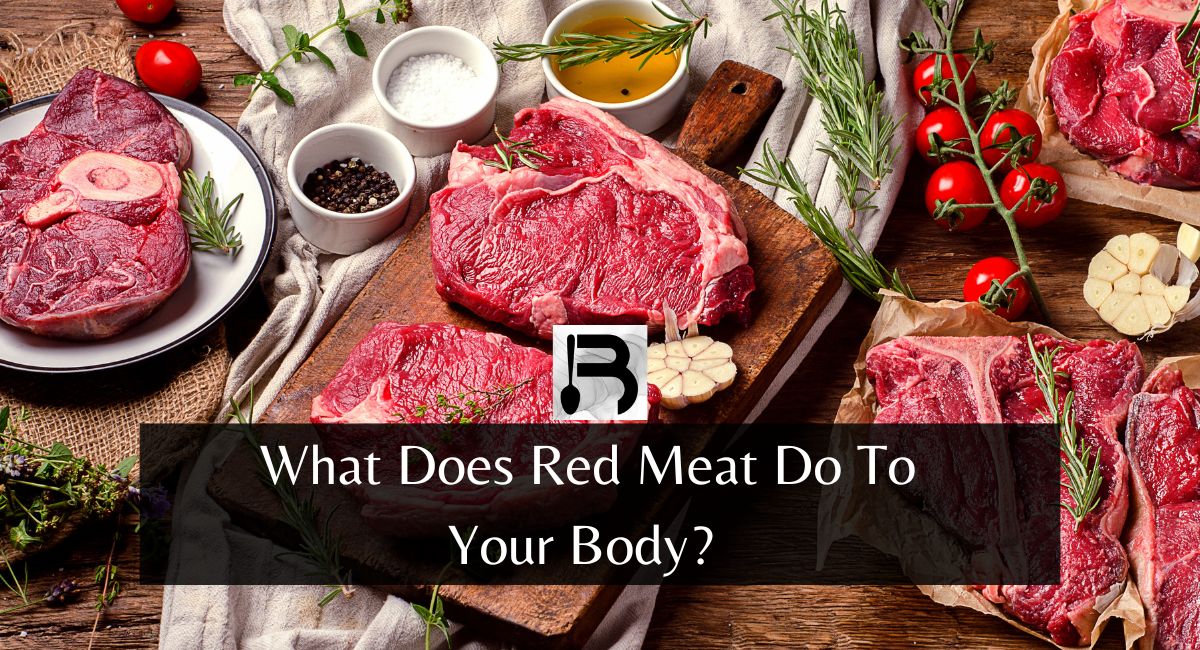Red meat, a staple in many diets worldwide, often finds itself at the center of nutritional debates. From steaks to lamb chops, these meats are not only cherished for their rich flavors but also scrutinized for their health implications.
While red meat is a source of essential nutrients like protein, iron, and vitamin B12, concerns have been raised about its consumption in relation to various health conditions.
In this article, we’ll delve into the science behind red meat, exploring its effects on the body and shedding light on the benefits and potential risks associated with its consumption.
What Does Red Meat Do To Your Body?
Red meat, which includes beef, lamb, pork, and venison, among others, has been a staple in many diets worldwide. When consumed as part of a balanced diet, red meat can provide valuable nutrients. However, excessive or improper consumption has been associated with various health concerns. Here’s a look at the effects of red meat on the body:
Positive Effects:
- Nutrient Supply:
- Protein: Red meat is a good source of high-quality protein, which is necessary for muscle repair, immune function, and overall body maintenance.
- Vitamins and Minerals: Red meat provides several essential nutrients, including B vitamins (especially B12), iron (in a form easily absorbed by the body), zinc, and selenium.
- Fats: Red meat contains omega-3 fatty acids, especially if the animals are grass-fed.
- Satiety: The protein and fat content in red meat can help increase feelings of fullness, potentially aiding in weight management when consumed as part of a balanced diet.
Negative Effects:
- Heart Disease:
- Saturated Fat and Cholesterol: Red meat, especially processed and fatty cuts, contains saturated fats and cholesterol, which, when ingested in excess, can raise LDL (“bad”) cholesterol levels, potentially increasing the risk of heart disease.
- Processed Meats: Processed meats like bacon, sausages, and deli meats have been more strongly linked to heart disease than unprocessed red meats.
- Cancer:
- Colorectal Cancer: Several studies have shown a potential link between high red meat consumption and an increased risk of colorectal cancer. The risk is more pronounced with processed meats.
- Cooking Methods: Cooking red meat at high temperatures, especially grilling or barbecuing to the point of charring, can produce harmful compounds like polycyclic aromatic hydrocarbons (PAHs) and heterocyclic amines (HCAs) that may increase cancer risk.
- Type 2 Diabetes: High consumption of processed meats has been related to an increased risk of developing type 2 diabetes.
- Digestive Issues: For some people, especially those not used to consuming it, red meat can be harder to digest than other proteins, leading to stomach discomfort or constipation.
- Environmental Concerns: While this isn’t a direct health effect, it’s worth noting that red meat production, especially beef, has a significant environmental impact. It requires more resources and produces more greenhouse gasses compared to the production of plant-based foods.
Recommendations:
- Moderation: If you choose to eat red meat, do so in moderation. The exact recommended amount can vary, but many health organizations suggest limiting red meat intake and opting for lean cuts.
- Diversify Protein Sources: Incorporate a variety of protein sources in your diet, including fish, poultry, legumes, and plant-based proteins.
- Cooking Methods: Opt for safer cooking methods like baking, broiling, or stewing rather than high-heat methods that char the meat.
- Processed Meats: Limit or avoid processed meats, which have been more consistently linked to health issues.
- Dietary Patterns: Consider overall dietary patterns, such as the Mediterranean diet, which includes red meat but emphasizes fish, whole grains, fruits, and vegetables.
In summary, while red meat can be a valuable source of nutrients, consuming it wisely and as part of a balanced diet is essential. Always consider the quality of the meat, the cooking method, and the frequency of consumption.
Is Red Meat Good Or Bad For You?
Red meat is a good source of essential nutrients like protein, iron, zinc, and B vitamins. However, excessive consumption of processed red meats like bacon and sausages has been linked to increased risks of heart disease, cancer, and other health issues. Moderation and preparation methods are key.
Grilling or frying at high temperatures can produce harmful compounds. For optimal health, balancing red meat intake with other protein sources and prioritizing lean cuts is advisable.
What Are The Healthiest Red Meats?
The healthiest red meats are typically lean cuts with fewer saturated fats. Examples include:
- Venison (deer meat): Low in fat and high in protein.
- Bison: Leaner than beef and rich in nutrients.
- Lean beef cuts: Such as sirloin, tenderloin, and eye of round.
- Lamb: Especially cuts like loin, shank, and leg.
- Goat: Lower in fat and cholesterol than beef or chicken.
Bottom Line
Red meat offers valuable nutrients that can play a role in a balanced diet. However, excessive consumption of processed red meats has been linked to health concerns such as heart disease, certain cancers, and other chronic conditions.
The way the meat is prepared, its source, and its frequency of consumption can all influence its impact on health. While enjoying red meat in moderation can be part of a healthy diet, it’s essential to be informed about its effects and make dietary choices that align with one’s individual health needs and goals.
Read More: What Food Has The Most Calories In The World?

